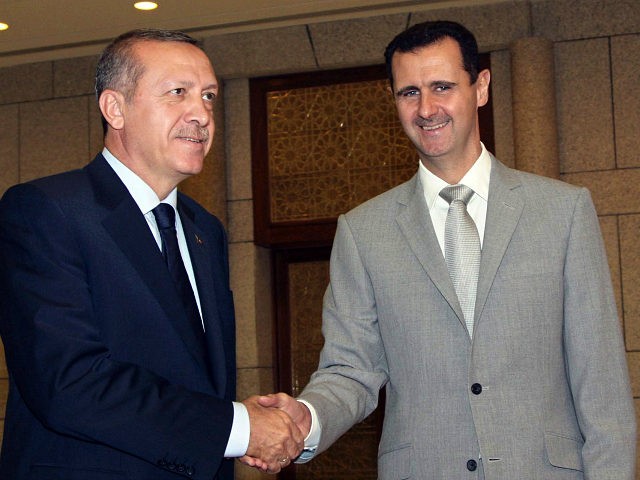There hasn’t been much love lost between Syria and Turkey since long before Syria’s civil war heated up in 2011, but the war of words escalated this week when Turkish President Recep Tayyip Erdogan called Syrian President Bashar Assad a “terrorist.”
The Syrian regime responded by accusing Turkey of supporting terrorism and spilling Syrian blood.
“Assad is definitely a terrorist who has carried out state terrorism. It is impossible to continue with Assad. How can we embrace the future with a Syrian president who has killed close to a million of his citizens?” Erdogan said at a press conference on Wednesday, stressing Turkey’s position that Syrian peace talks will go nowhere as long as Assad remains in power.
“Assad, I am saying this loud and clear, is a terrorist who spreads state terrorism,” he declared. “Would the Syrian people like to see someone like this stay in charge?”
Erdogan predicted the Assad regime would be unable to monitor “de-escalation zones” or restore order along the Turkish border.
“It is impossible for Turkey to accept this. Northern Syria has been handed over as a terror corridor. There is no peace in Syria and this peace won’t come with Assad,” said the Turkish president.
“It is absolutely impossible to move ahead with Assad in Syria. For what? How could we embrace the future with the president of a Syria who killed close to one million of its citizens?” Erdogan asked.
The Syrian civil war has been a bloody nightmare that destabilized the Middle East, and arguably threatens to destabilize the entire world through the refugee crisis and global terrorism it spawned. Erdogan’s talk of a “terror corridor,” however, largely refers to the Syrian Kurds, whose militia forces Turkey sees as aligned with the violent PKK Kurdish separatist party in Turkey. Erdogan would like to see neither the Kurds nor Assad in attendance at Syrian peace talks early next year.
On the other hand, the United States and its coalition view the Syrian Kurds as vital battlefield allies against the Islamic State. This could become a very uncomfortable situation if Turkey, a NATO member, follows through on its threat to launch a full-blown military offensive against Kurdish forces occupying key cities near Syria’s border with Turkey.
Adding to the complexity of the situation, the Russians have made overtures to both the Kurds and Turks, following a period of antipathy between Russia and Turkey that seemed to be skirting the edge of outright military conflict.
Russia might now be interested in playing the Turks and Kurds against each other to ensure that neither is too influential in postwar Syria, which Moscow definitely sees as being governed by its client Bashar Assad. The Russians may also find some strategic value in Turkey serving as a check on Iranian influence in Syria, even as the three nations publicly portray themselves as unified in seeking a peace deal to end the Syrian war.
Syria’s Foreign Ministry responded to Erdogan’s comments on Thursday, accusing him of spilling Syrian blood by supporting rebel groups during the civil war.
“The entry of the Turkish forces to the Syrian territory reveals one image of Turkey’s support to takfiri terrorism,” sneered the Syrians.
“Takfiri terrorism” means terrorism committed by Muslim apostates; it is an insult often hurled by Shiites at Sunnis, or vice versa, when they accuse each other of slandering Islam by perpetrating atrocities in its name. Syria, which has a ruling class dominated by the Alawite branch of Shia Islam, often refers to the Sunni fundamentalist Islamic State as the paramount example of takfiri terrorism.
That makes for a most impolite response to Erdogan, and the Syrians followed up by accusing him of delusional desires to establish his own caliphate by putting the old Turkish-dominated Ottoman Empire back together.
According to the statement published by Syrian state media, Erdogan is haunted by “paranoia and illusions of the past” that make him “forget that his old empire has vanished and that the free people of the world have the choice to make their national decisions and defend their sovereignty and they will not allow Erdogan to interfere in their affairs.”
It should be noted that peevish Assad flunkies are not the only ones to accuse Erdogan of harboring unhealthy levels of Ottoman Empire nostalgia and aspiring to become the next “caliph” himself.

COMMENTS
Please let us know if you're having issues with commenting.